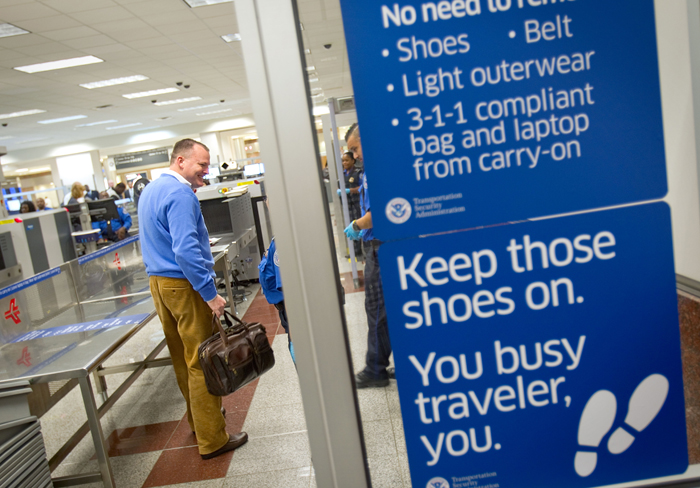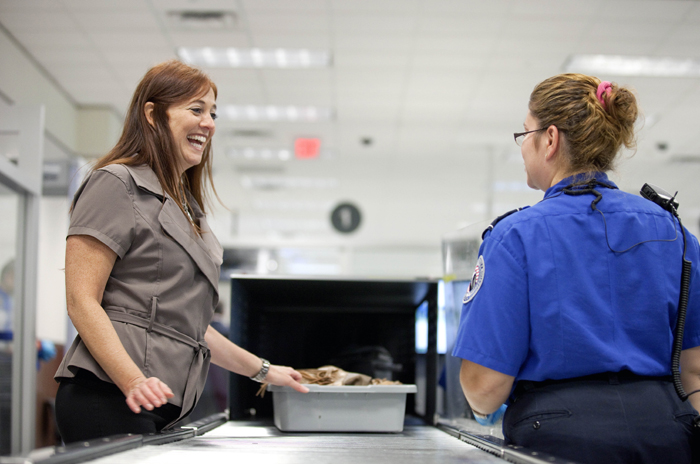ATLANTA — A small group of frequent fliers began using lower-hassle security lines today in exchange for sharing more personal information with the government in a trial program at four U.S. airports.
The “PreCheck” program represents a big attempt by President Barack Obama’s administration to move away from a one-size-fits-all security approach and toward a model that tailors passenger checks to what the government knows about them. It is being implemented after a public backlash and protest campaign last year over sometimes invasive pat-downs for travelers who refused to step inside full-body scanners.
The new program requires a basic trade-off. Passengers allow airlines or other government agencies to share their personal information with the U.S. Transportation Security Administration so they can be pre-screened before arriving at the airport. In return, passengers get a chance — not a guarantee — that they can move through faster lines and avoid removing their shoes, belts or light coats while keeping laptop computers and liquids in their travel bags.
If successful, the pilot program could spread beyond a small sliver of travelers and airports in Atlanta, Miami, Detroit and Dallas-Fort Worth.
The system’s opening run in Atlanta earned positive reviews from several of the passengers who used it, but it also illustrated that they won’t be immune to all traditional security procedures. They came to the same security checkpoint as other passengers, but were ushered to a specialized line. Rodney Berry of Atlanta praised the new system even though his bag got searched by hand at the end.
“It seems like it was faster, even though I got stopped,” said the 42-year-old who typically flies at least once a week.
TSA Assistant Administrator Chris McLaughlin said the benefits of the program are twofold.
“This program allows us to focus on individuals that we know a great deal about,” he said during a news conference at Hartsfield-Jackson Atlanta International Airport. “… At the same time, it frees up resources for us to apply to individuals that we know less about and potentially pose a greater risk to aviation.”
The voluntary test program covers travelers enrolled in Delta Air Lines’ and American Airlines’ frequent-flier programs or three government-run traveler programs — called Global Entry, NEXUS and SENTRI — at the four airports. Participants in the existing government programs undergo background checks and are interviewed by customs officials to get cards that allow them to pass through customs more quickly.
The new PreCheck program is very small. TSA officials estimate that somewhere from 5,000 to 8,000 travelers could eventually be ushered through the specialized security lines daily. That’s less than 1 percent of the average number of passengers screened daily at domestic airports. No one in the program is guaranteed an expedited screening, and the TSA says they’re still subject to random and unpredictable security steps.
McLaughlin said he could not disclose for security reasons exactly how the TSA will screen passengers in the pilot program before they check in.
The government already pre-screens all U.S. passengers, typically checking their full names, birthdates and genders against government databases of potential terrorists. But frequent-flier programs and the government traveler programs collect more data. For instance, personal information provided in Delta’s frequent-flier program includes the traveler’s home address, email address or phone number, and preferred language.
On Monday, the federal agency also announced it will spend $3.2 million on new technology intended to automatically spot fake government identity documents and airport boarding passes. It’s expected to be tested early next year and will be incorporated into the pilot program.
Brad Childress, 59, was among the first passengers to breeze through the specialized security line in Atlanta. He set off the metal detector when he forgot to remove a money clip from his pocket, but he called the process “a piece of cake.”
He wears leather loafers without shoelaces to the airport since he usually has to take them off as part of a normal security screening. On Tuesday, his shoes stayed on his feet. He said he never believed that the traditional security screening made the country safer.
“I always thought that was a false sense of security anyhow,” he said.
The frequent traveler on Delta was unaware he had enrolled in the program, though airport officials say he may have authorized the airline to share his information on an electronic form without realizing it.
Childress said he would have to learn more about the information he was sharing with the government before deciding whether he objected.
“They already know where I’m traveling, they know where I live, they know what my credit card number is,” he said. “So they know a lot about me.”
Send questions/comments to the editors.



